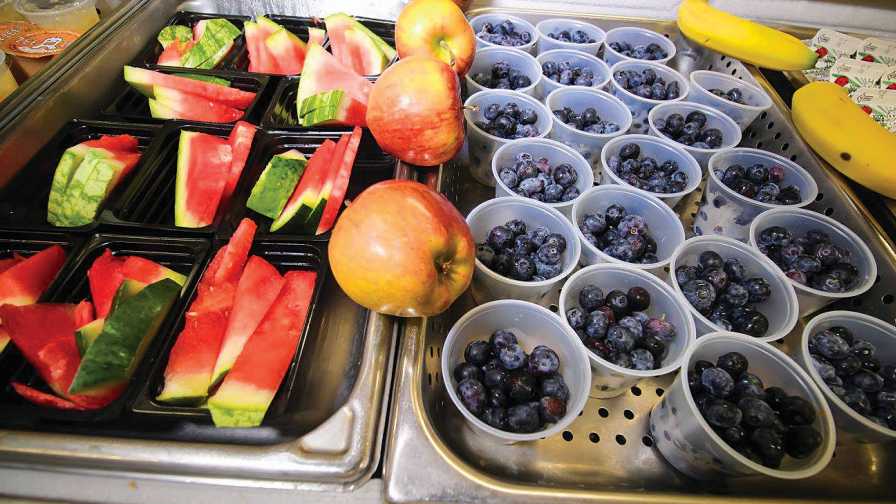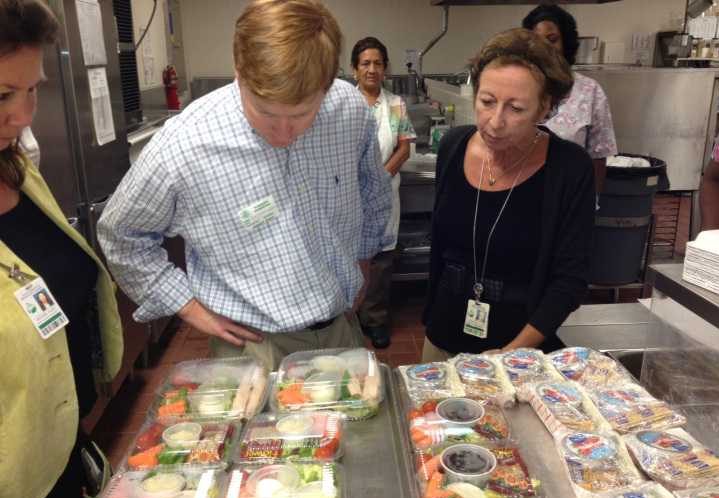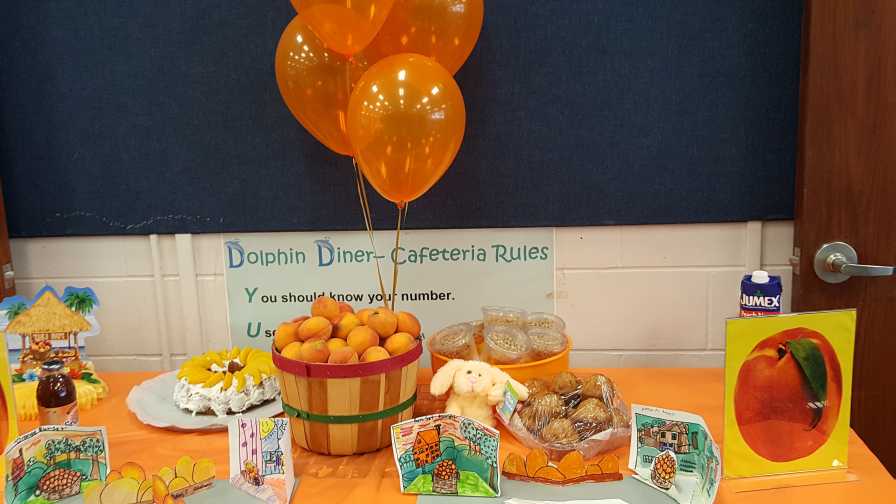Florida Farm to School Initiative Makes New Strides

Florida-grown blueberries and watermelon are freshening up students’ lunch choices.
Photo courtesy of Sarasota Public Schools
In 2012, Florida Grower® magazine featured the new Farm to School program being launched by the Florida Department of Agriculture and Consumer Services (FDACS). That year, the state school lunch program was moved from the Florida Department of Education to FDACS.
Under the agency, Farm to School has evolved with varying degrees of success school district by school district. But, overall, the program is making headway with its intended purpose of getting healthy Florida fruit and vegetables on the plates of students and hopefully creating loyal consumers in the future.
According to FDACS, the department has assisted in the sale of at least 870,000 pounds of Florida produce to the state’s schools since 2015. About 207,000 pounds of Florida peaches were served this past school year alone.
Centralized and Flexible
Among the success stories has been the work of Collier County Public Schools. In the past couple of years, the district has amped up its Farm to School program and plans to continue and accelerate in the future. According Dawn Houser, Director of Nutrition Services with Collier County Public Schools, flexibility and being able to move quickly helps the program be successful.

Dawn Houser
“We are growing the program and have a lot of potential for future growth,” she says. “In my district alone, we buy more than $1 million of produce per year. We are not the biggest district, but are not small either. We are more centralized than some school districts where individual schools plan their menus. Our managers have some flexibility, but we [main nutrition office] provide the shopping list as far as what is seasonal and in production and what is cost effective. This gives us more buying power, too.”
Collier County is home to 50 public schools with about 48,000 students. There are about 14,000 breakfasts, 25,000 lunches, and more than 1,000 dinners served in the system daily. Through the federally manadated “Healthy, Hunger-Free Kids Act,” all schools must serve a fresh fruit or vegetable with every breakfast and lunch served. While the Act requires a lot of healthy produce to be served, Houser is most excited about snack time.
USDA’s Fresh Fruit and Vegetable Program (FFVP) provides funds to schools to introduce elementary students to fresh fruits and vegetables as snacks rather than chips, chocolate, and other less-healthy alternatives.
“The FFVP is the most awesome program to come out of Washington, DC, in many years,” Houser says. “We are getting these fruit and vegetable snacks in front of elementary students while their taste buds are developing.”
Houser says the program is more effective being delivered as a snack in the classroom rather than the mandatory fruit or vegetable served in the lunch line.
“When you go into classrooms in the snack program, it is so fun watching the students,” she says. “The kids watch the teacher try the fruit, then maybe a couple of the students try it and start oohing and aahing over it, then all of them try it.”
The FFVP is challenged in that USDA gives all states an equal amount of dollars regardless of population, along with certain eligibility requirements that preclude some of elementary schools from even participating. Nineteen of 30 elementary schools in Collier County do not qualify for the program. That led Houser and her team to develop another innovative initiative called the Farm to School Snack program (F2SSP).
“With 19 of our elementary schools not funded by the USDA snack program, we elected to develop our own program and fund it locally because we believe it is such a good and worthwhile effort. I don’t believe there is another program like ours in the U.S.,” Houser says. “We have fun with it, with neat facts about the fruit or vegetable being featured. And, we tend to focus more on fruits, since we know that is something the kids will like and eat.”
The Collier County F2SSP has been so popular, a middle school has expressed interest in expanding the program beyond elementary schools. Houser is looking into ways to make that possible.
Between the school meals and snack programs, Collier County has set a fine example of how to bring local produce into the schools that will hopefully inspire kids to develop healthier eating habits for a lifetime. And, in the process, it creates new markets for growers.

Florida Agriculture Commissioner Adam Putnam made the Farm to School program a signature issue of his tenure in office.
Photo courtesy of FDACS
Connect with Growers
Making a connection with local growers is a major first step in a successful Farm to School program. Houser has made some great relationships with farmers already and plans to build on those and engage more.
“We have joined Blue Book and the Southeast Produce Council to help engage with growers,” she says. “We are the first school district in the country to be listed on both. We are still learning, but have reached out to local farms and have been very successful, especially this past school year.”
One successful relationship has been established with Belle Glade-based TKM Farms, which sold Romaine lettuce to Collier County schools.
“Rather than sourcing Romaine from California at $60 per case, we are now getting much fresher lettuce right next door from TKM Farms for $15.50 per case, which saved Collier County $13,000 in the month of April alone. They were cutting the lettuce the day before we picked it up as opposed to two weeks coming out of California. They have been fabulous to work with.”
One of the learning curves schools and growers must go through is understanding each other’s language. Houser says she now knows more about the importance of never breaking the cold chain, food safety and audits, and seasonality of Florida crops. The growers learn about how the schools need product delivered. An example of this was their collaboration with Red White and Blues Farm, which agreed to pack fresh blueberries in 5-pound boxes rather than clamshells.
“We serve the blueberries in half-cup portions, so the clamshells are not really helping us,” Houser says. “Plus, we are paying drayage, so the clamshells add to my shipping costs. That was really a big deal for us having the blueberries delivered in the 5-pound boxes.”
Opportunity Buys
One area FDACS and school districts have identified as a win-win in the Farm to School program is opportunity buys. In growing produce, weather changes and markets change, which provides schools a chance to get a great deal on produce and helps growers find a buyer.
Houser notes one such opportunity buy from this year with a watermelon grower whose weather had changed and his melons were too ripe for selling on the wholesale market. The grower offered the melons for $2 a piece and her shipping was $2 a piece. At the time, the going rate was $6 per melon.
“We bought a truckload full of the watermelons,” Houser says. “The grower was thrilled because he would have been plowed under otherwise. Our students were thrilled because we had wonderful, ripe watermelons and we saved $2 per melon in the process. As we make new connections with growers and learn more, we are going to be able to take advantage of more and more of these opportunity buys.”
According to FDACS, communication is the key to success.
“We’ve identified distribution from farms to schools as an obstacle that some school food service programs have encountered,” says Aaron Keller, Press Secretary for FDACS Commissioner Adam Putnam. “In response, we’ve been proactive in facilitating conversations between schools, their distributors, and Florida farmers to assure fresh local food is making its way to Florida students.”
Shane McDonald with Plant City-based Sweet Life Farms worked with the Farm to School program for the first time this year. He says they were honored and excited to supply strawberries to the students. He agrees communication is a key to success.
“The biggest obstacle we faced in the beginning was arranging freight for our shipments,” McDonald says. “Ashley Wheeler (Supervisor of Nutrition, Menu Planning, and Procurement with Collier County Public Schools) was very helpful and was able to arrange a truck to deliver strawberries each week. Without her help, it would have been very difficult for us to participate. She and Dawn were very helpful explaining everything we needed to know about the program.”
“We are very excited about the savings we achieved for our program and money we have sent back to our Florida farms,” Houser says. “We want to use Florida produce because of that and because we want produce that tastes fabulous.”
According to Keller, FDACS will be seeking to facilitate even more connections between Florida schools and farms in the coming year. For more information on the program, send an email inquiry to
[email protected].

Florida Peach Day was a success in school cafeterias aplenty.
Photo courtesy of Florida Classic Growers
Make it Fun and Tasty
Beyond having school kids eating healthier, the Farm to School program aims to educate students about the produce they are eating and to promote the important work of local growers. That is accomplished in various ways in school districts across the state. Morning announcements about a fruit and vegetable, handouts, trading cards featuring local growers, farm tours, and much more are ways to make the learning process fun.
Another tactic schools use is setting aside a day to feature Florida-grown items. Collier County Public Schools hosts “Fruitopia Day” that features a Florida-grown fruit. This year, peaches were featured. Florida Classic Growers supplied the peaches and were thrilled to participate.
“The event was great,” says Al Finch, Florida Classic Growers. “Many of the schools went out of their way to build displays of peaches and utilize them in multiple recipes. It is awesome to see school systems like Collier going the extra mile to support locally grown produce.”
In May, Sarasota County Public Schools featured “Fresh From Florida Plate Day” to celebrate locally grown items. The entire meal was sourced from Florida growers. The farmers who grew the food also visited some of the schools to talk with the kids about the importance of agriculture.










